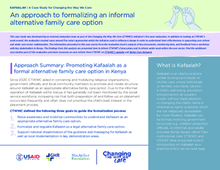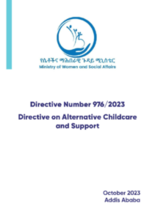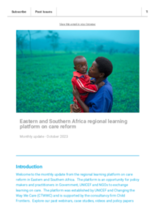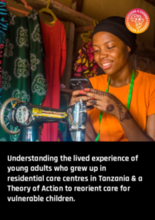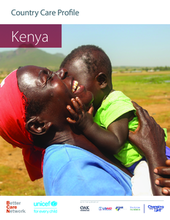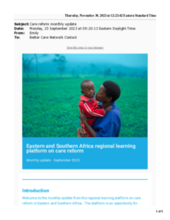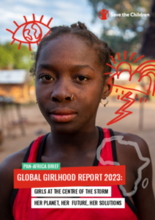Displaying 151 - 160 of 1627
In this webinar, a new paper on strategies to prevent family separation is presented. Examples from Rwanda, Kenya, Uganda and Namibia are presented.
This case study, developed by an external evaluation team as part of the Changing the Way We Care (CTWWC) initiative’s five-year evaluation, examines efforts in Kenya to promote and formalize Kafaalah as a recognized alternative family care option.
Recognizing the increasing number of orphans and vulnerable children (OVC) and the need to provide standardized and quality alternative childcare and support services, The Ministry of Women and Social Affairs (MOWSA) in collaboration wit
This is the monthly update of the Eastern and Southern Africa Regional Learning Platform published in October 2023.
This mixed-methods study collects survey data from 253 adults involved with vulnerable children in Tanzania and narrative data from 31 young adults who experienced residential care during their childhood. The research fills a gap in the literature about the lived experiences of children in institutional care and the impacts of this type of care on their lives.
On 21st September 2023, the Governments of Canada and Zambia, in partnership with UNFPA-UNICEF Global Programme to End Child Marriage and the Child Marriage Monitoring Mechanism, hosted a High-Level Side Event during the Seventy-Eighth Session of the United Nations General Assembly. The event was titled 'Charting Brighter Futures: Utilizing Data for Accelerated Action to End Child Marriage and Achieve SDG 5.3'.
The government of Kenya has been working with UNICEF, Changing the Way We Care, Charitable Children's Institutions and local CSOs to pilot care reform at the county level. Learning from these demonstration counties is being used to shape care reform in other counties and at the national level. This video explores care reform in one demonstration county, Kisumu.
This country care profile provides an overview of key lessons learned in the children’s care reform process in Kenya, including successes, challenges and areas for progress, and gaps in learning and best practice.
This is the monthly update of the Eastern and Southern Africa Regional Learning Platform published in September 2023.
The climate crisis is already changing girls’ lives and futures. Girls across Africa are facing growing challenges as the climate crisis increasingly impacts the continent, leading to a range of extreme weather patterns. In southern parts of Africa, girls are enduring devastating cyclones and floods. Meanwhile, the Sahel, Eastern, and Horn of Africa regions - home to the highest rates of child marriage - are grappling with severe droughts. Climate-induced migration is also on the rise in Western, Southern, and Central Africa.

